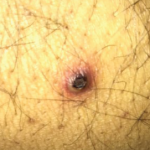NEW YORK (Reuters Health)—Dermatologic complications hit about one in five patients with inflammatory bowel disease (IBD) on anti-tumor necrosis factor (anti-TNF) therapy, leading to discontinuation of treatment, a French study finds.
Dr. Laurent Peyrin-Biroulet, from University Hospital of Nancy, and colleagues note that dermatological complications of anti-TNF therapy are known to occur frequently in IBD patients, but until now no study has investigated their incidence, management, and outcome in a large cohort of IBD patients.
Among 583 IBD patients on anti-TNF therapy seen at their center over 14 years, 176 dermatological complications occurred, involving 20.5% of patients, most commonly psoriasiform (10.1%) and cutaneous (11.6%) lesions, they report in the American Journal of Gastroenterology, online July 21.
At five years, the cumulative incidence of all anti-TNF-induced skin complications was 26%. Younger age at initiation of anti-TNF treatment and Crohn’s disease were significantly associated with a higher risk of skin problems, they found.
At five years, the cumulative incidence of skin infections with anti-TNF therapy was 6.4%, and higher doses were significantly associated with a higher risk.
One in five patients with psoriasiform eruptions stopped taking the anti-TNF agent as a result, but “appropriate and early topical- and/or systemic-specific dermatological therapy can avoid anti-TNF discontinuation in half of patients,” the researchers say.
Psoriasiform lesions recurred in more than half of patients who switched to a different anti-TNF agent. Despite this, the researchers say trying a different agent “should be highly considered before definitive discontinuation.”
The key limitation of the study is its single-center retrospective setting and not having systematic prospective skin evaluations in all patients.
“Taken together, our findings could be used to guide decision making in anti-TNF-treated IBD patients developing skin lesions,” the researchers conclude.
Dr. Peyrin-Biroulet did not respond to request for comment by press time.
The study had no funding. Three authors report relationships with pharmaceutical companies including AbbVie, Merck, Pfizer, and Sanofi Aventis.

